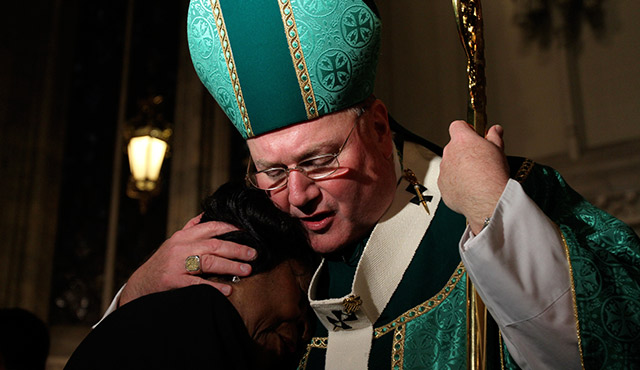When James Sanders’ daughter was 5, her goldfish died. As a practicing Catholic and licensed marriage and family therapist, Sanders’ mind immediately went to the big question: “How can I introduce death to my 5-year-old daughter?”
He set up a burial scene in the backyard, and gave a short eulogy, making sure to bring in some Catholic principles. His daughter listened solemnly, then said, “Dad, our fish is going into the ground and it’s going to decompose and help the soil, but its soul will go to heaven and become an angelfish.”
On the grief scale, the death of a pet fish is a small occurrence. Still, Sanders’ daughter used one of the tools Sanders finds important when helping others deal with larger losses.
“Using stories and metaphors can help us realize that death is a transition,” Sanders explains. “And help us to better understand that if there wasn’t death there wouldn’t be life. We can appreciate life more because we know it’s temporal.”
Of course, understanding what happens after a person or animal dies doesn’t always help with the often more looming question of why. Why, if God is good, does tragedy occur at all?
Father Thomas P. Rausch, the T. Marie Chilton Professor of Catholic Theology at Loyola Marymount University in Los Angeles, says, “People sometimes are tempted to blame God in times of tragedy, but that doesn’t work. God does not ‘cause’ tragic loss or suffering; Jesus, as one like us, knew it intimately, and God grieved for the suffering of his only beloved Son, as he grieves for all the pain of the children he so passionately loves.”
Sanders adds, “People will ask ‘Why did this have to happen?’ and we say ‘Who are we to question God’s decisions and plans?’”
The power of people
“When Bad Things Happen to Good People,” published in 1981, is a seminal book about coping with grief and loss that attempts to answer the “why” of tragedy. Written by Rabbi Harold Kushner after the death of his son as a result of a degenerative disease at age 14, the book is an exploration of the doubts and fears that arise in the face of great loss. It has become a beacon for many who are suffering tremendous grief.
In a new preface written by Kushner in 2001, he said there is a line from the book that is often quoted back to him. It’s not a sentence written by Kushner, but a quote he found by a 19th century rabbi: “Human beings are God’s language.”
The meaning, writes Kushner, is that God sends us people to help us deal with loss: Friends to help us through, doctors and nurses to heal us, family to sit by our side.
This sentiment coincides with what Father Rausch advises for dealing with grief. He says, “People who are grieving need people to be with them, just to be present; also, we have to allow ourselves time to grieve. It does little good to try and suppress it, or to deny it.”
Sanders also finds that a support system of people is one of the best remedies for grief. “It’s important just to attend to them and be silent. It’s a time to come together and be thankful for what we have. We need to help them transition.”
Moving beyond why
For most, the “Why” of grief will never be sufficiently answered, but there are ways to ease yourself or others through the suffering process.
In addition to a support network of friends and family, counseling can be useful, as can books about the topic. Sanders likes to get patients involved in finding a book that resonates with them, rather than picking one for them to read.
Patty Broesamle, manager of Paulist Press bookstore in Costa Mesa, offers these suggestions for a Catholic point of view: “Praying Our Goodbyes: A Spiritual Companion Through Life’s Losses and Sorrows,” by Joyce Rupp; “Healing the Soul: Finding Peace and Consolation When Life Hurts,” by Deacon Eddie Ensley; “God Knows You’re Grieving: Things to Do to Help You Through,” by Joan Guntzelman; and “Catholic and Mourning a Loss: 5 Challenges and 5 Opportunities,” by Mauryeen O’Brien.
When enough time has passed, tragedy can be dissected for meaning, or become a learning opportunity. Sanders says, “Everyone is gifted by everyone else’s life. What can I learn to be a better person from someone else’s life? Grief is an opportunity to recreate yourself and have a new awareness. Try and make it more of a positive process and let it help you appreciate the relationships you have in your life.”
Father Rausch suggests you see grief as a way to better connect with God. “Grieving means dealing with pain, loss, tragedy, which is our share in the Paschal Mystery of Jesus; it means that we enter into his passion in faith so that we, too, might share in the Resurrection.” He suggested Philippians 3:7-11 as an example. One passage says, “For his sake I have suffered the loss of all things and count them as rubbish, in order that I may gain Christ and be found in him.”

